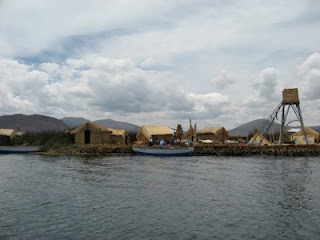
Puno's main claim to fame is that it is the gateway to Lake Titicaca, the world's highest lake. Otherwise, it is largely unremarkable, although one of the guide books (I think it is Lonely Planet South America) correctly points out that the drivers are more pedestrian friendly when compared to other Peruvian cities.
I arrived in Puno on an overnight bus from Cusco, together with the John the Canadian Globetrotter (see Lima post). I did meet up with him in Cusco, went to Machu Picchu and some of the museums. John is off to Bolivia, only 3 hours by bus from Puno, while I continued to Arequipa later that day (Dec 27).





One of the big attractions of the lake is Uros: a group of inhabited man made floating islands. The islands are constructed mainly of a local type of reed (whose root is edible, although tastes quite bland), which are combined to form floating blocks. These blocks are then combined together with ropes to make larger islands. The stry of how Uros islands are made is part of the tour (10 Soles for the boat trip, 3 soles for the "entry" fee or about 4.33 US$ in total) given by one of the locals. And although the talk was in Spanish, enough gestures are used to get the point across. The islands themselves are anchored, and quite soft ... comparable to a mattress - one of those Sealy Posturepedic types, not waterbeds :p

The islands do not lack modern conveniences though: solar panels provide electricity and there are even phone booths! Although it is clear that some of the islanders still fish, I am not sure how many of them actually carry on their traditional lives. Looking at the number of boats that were docking at the various islands, it seems that Uros has become more of a living cultural curiosity rather than an actual culture. This is not new off course ... in SA we have Shakaland, and I remember something similar in Germany. While it is great to save a culture, I am not sure if it is worth saving simply for the sake of saving ...
No comments:
Post a Comment